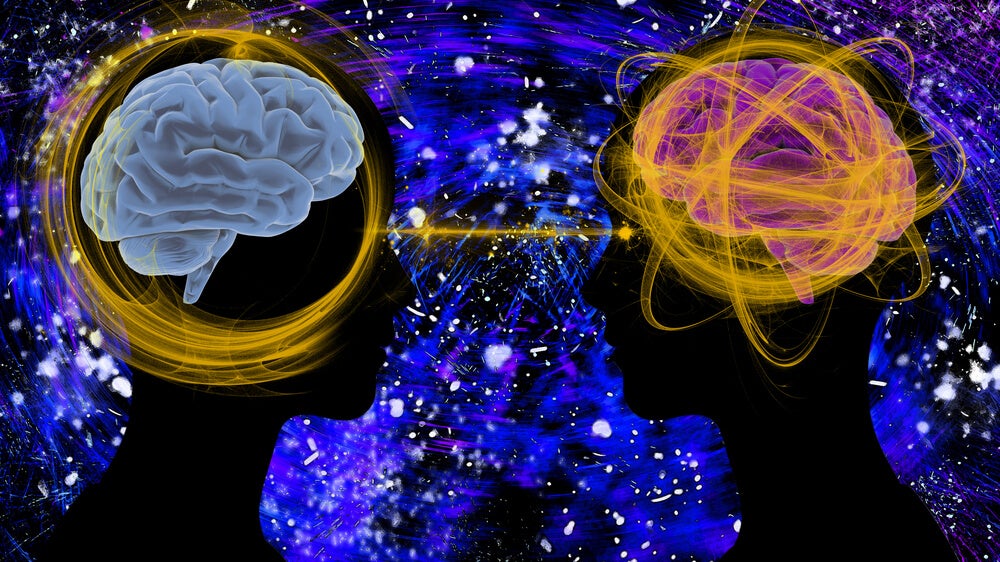It was not until the twentieth century that telepathy began to be evoked, no document or trace of antiquity refers to this phenomenon, the truth is that once the subject was put on the table, it continued to provoke controversy, to this day science refuses to accept that telepathy exists. At the same time, testimonies of telepathic experiences continue to emerge.
Telepathy is defined as the transmission of thought remotely without the intervention of any technology that ensures this communication. Wireless communication between two human brains. Thousands of people claim to have had this experience, but so far it has never been possible to replicate this phenomenon in the laboratory.
- “If telepathy has radically changed human communication codes.
- ” telepathy?He revolutionized his sensory universe?.
- -José Luis Rodríguez Jiménez-.
Scientists have indicated that telepathy, from a physical point of view, is not plausible. No section of the brain can act as a transmitter or receiver for remote communications. The electromagnetic power of the brain is also not capable of carrying information, and there is no known way to do it.
In the context of classical physics telepathy is impossible, however, in the context of quantum physics things are different, in fact many known physicist have spoken of this phenomenon and do not close the door to the possibility of telepathic communication. The subject is not closed.
In light of thousands of testimonies from people claiming to have experienced telepathy, some scientists have pledged to study the phenomenon. One of the most famous experiments was conducted by Karl Zener. Through five cards, rigorous statistical monitoring was carried out. conducted with a group of participants. The results of this experiment yielded no solid conclusions.
On the other hand, researchers Montaque Ullman and Stanley Krippner of Maimonides Medical Center in Brooklyn, New York, conducted an experiment on telepathic transmission during sleep, the results of which suggest that, in many cases, the image in the sender’s mind appeared in the recipient’s dream. However, the study was interrupted.
Another famous research was that of the Ganzfeld Experiences. A total of 88 experiments were conducted between 1974 and 2004. Se launched a telepathic success rate of 37%. The results were controversial and new experiments were conducted, indicating 34% of correct responses. Statistically, this result is significant; however, in practice, this has raised many doubts, which is why the investigation has also been abandoned.
Rupert Sheldrake, a biochemist and physiologist at the University of Cambridge, conducted another telepathic experiment between 2003 and 2004. After 571 attempts at telepathic communication with 63 volunteers, he found that the percentage of correct answers was 41%. He has published these results in various scientific journals.
The most controversial aspect is that telepathy contradicts the laws of classical physics and other sciences. The possibility of existence would involve the reformulation of several axioms that are now considered valid. From the point of view of physics and neurology, it is impossible for a process to take place in the brain without a sensory or internal stimulus that triggers it.
For conventional science thought is a biochemical process, therefore, it does not come if there is no material stimulus, telepathy is precisely the absence of that material stimulus, so apparently one reality excludes the other. However, hypotheses have been raised from the point of view of quantum physics that speak of other forms of interaction in the matter.
Roger Penrose, a physicist and mathematician specializing in the theory of relativity, postgraduated the existence of quantum biophysics of the mind. He was accompanied by Stuart Hameroff for his thesis, an anesthesiologist at the University of Arizona. Penrose-Hameroff hypotheses open a path to understanding whether telepathy exists from a scientific point of view. However, instead of conclusions, what has been proposed is a new field of research.
Many people recount experiences of telepathic communication. The certain arrogance that exists?On the part of those who defend current supposed scientists, it has prevented the continuity of research in this area, beyond the isolated studies we report.
In this sense, another of the great problems of telepathy is that, on some occasions, it was used for manipulation and even for magic, however, science will have to determine whether it will stop there or, on the contrary, whether we will open. a new door to a room full of interesting questions.
What do you think? Is there telepathy?

